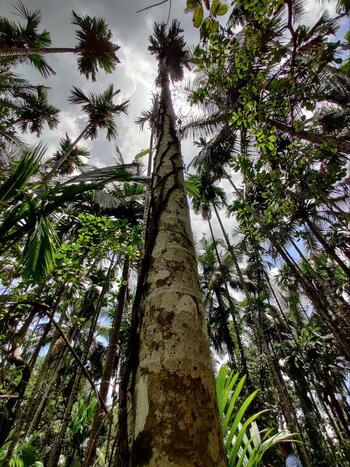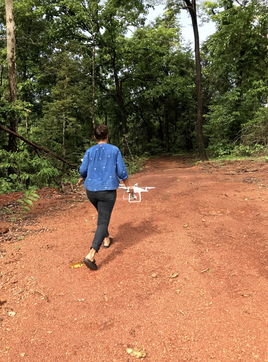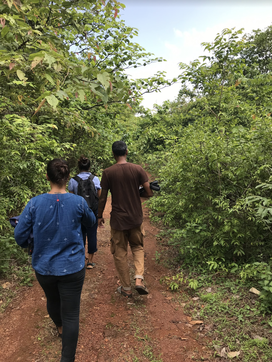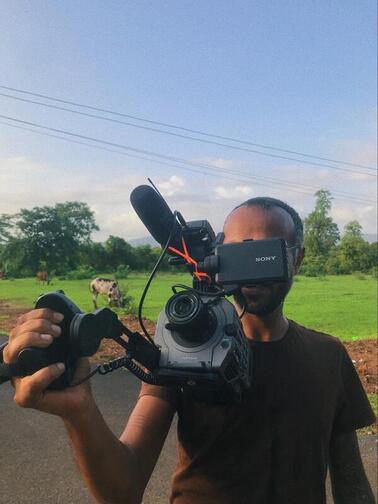 Photo Courtesy of Taira Malaney Photo Courtesy of Taira Malaney Taira Malaney was interviewed by Robin McGahey, guest writer Taira Malaney is an independent filmmaker from Goa, India. Her newest film, My Mollem: Goa’s Green Heart, is an ode to her beloved home of Goa, and a call to action for the Goan government. The beautiful film discusses the rich biodiversity in Mollem National Park, and the potential impact of deforestation. Our guest writer, Robin McGahey, sat down with Taira, to take a look behind the scenes, into Goa’s Green Heart. To watch the film in English: https://bit.ly/3bsCqXx To watch the film in Konkani: https://bit.ly/2NOPpuA Q: What inspired this story? My Mollem initially came to me through social media. The campaign had already begun by the time I came on. It was engaging and thought-provoking, and as it was discussing deforestation in Goa, it hit very close. I reached out to a friend, who is running the core team, alongside the scientists and citizen scientists, artists, painters, and animators. I knew after diving into the project, I wanted to tell the story in a short documentary. Q: What inspired you to join the Mollem campaign? My involvement with this film actually began in 2019 at the Jackson Wild Summit. I connected with a fellow filmmaker from Goa. She reached out to me during the pandemic to come on as an editor for her film. After spending time together, learning about the lockdown struggles in our home, I was inspired to create a story surrounding the beautiful state of Goa. The pandemic really showed me how special and rewarding it is to stay local, working on stories close to home, with the people living through it. Q: How did you approach telling this story? Coming into this project, I knew I wanted the POV to be from the community. Located in southern Goa, the village of Mollem is very small, isolated, and densely forested. I wanted the narrative to focus more on the people and community voices, while still keeping the risk to biodiversity at the forefront. I reached out to local scientists to be our guide, and found a young, energetic girl to be our voice. I wanted to weave in the idea of intergenerational equity, an economic concept that refers to the wealth of the state's natural resources and the need to preserve it for the future generations. In this case, we’re looking at the question, “What are we leaving for the future of our children, if we let the main water sources of the state be destroyed?” Q: Who is the lovely narrator? We actually have two narrators, because there are two versions of the film. For the English version, we met the young girl through a local colleague. A friend of hers heard about our project, and she, and her nine-year old daughter really wanted to help out. I knew immediately when I met her that she would be a great fit. She had an amazing voice, filled with passion and so much emotion. She was the right person to take us through this story. In the Konkani version, the local language of Goa, our narrator was a young girl we met through the incredible Goa Outreach Program. It was a really cool experience because she wasn’t aware of the threats facing Mollem, so she got to learn, and be part of this project. Q: Talk to me a little bit of the visuals of this film. What did you use? So much comes back to Jackson Wild. At the time, I was paired with Tom Mustill, who uses a lot of stock footage in his films. We spoke about reducing carbon footprint and cost by diving into archives. I had seen how powerfully this had come together in his recent short film Nature Now, and so decided to give it a try. We sourced all the footage through stock footage, except the interviews. People were really welcoming when it came to sharing footage, and excited to collaborate. Q: Were there any surprising or meaningful moments/experiences you want to share? While filming, we took the time to meet with the community, especially the students and scientists. Two interviews especially stayed with me. One was a botanist and the other a med student that specialized in zoonotic diseases. I was amazed to see the people in the village fighting this hard to save Mollem. They had these incredible points of view and strong opinions about the local biodiversity. The botanist, a young woman, had focused her career on a specific species of fungi that lived in the forest. I realized the ignorance I came into this community with, looking at the community as something that needed to be understood, when really, they are doing it on their own. I was so inspired. Another good moment was on the first day of shooting. There was a thick fog bank, and we ended up losing our drone. Thankfully a local man came to our rescue, climbing, of course, the tallest tree in the forest to retrieve it for us. I took it as a sign. Know the forest before you send a drone into it. Q: What did you learn from your experience making this film/program? This was my first impact film, so as you can imagine, I learned a lot. My biggest learning was that a film can be made with a really small crew and budget and still have a significant impact. With the goal of impact, we worked with the campaign team from the very beginning. It created opportunities for connections and collaboration that made it so much better in the end. Q: Speaking on impact, what impact do you hope for this film to have? Is there a Call to Action? When we initially released this film on social media, we immediately saw a spike in campaign engagement. The video was viewed by hundreds of thousands across India. Shortly after that people began protesting, and the issue was brought up to the Central Environmental Committee (CEC) in the Supreme court of India. They have already performed a site inspection earlier in January 2021. The state has vowed to go ahead with the projects, despite local opposition, saying that these projects are needed for Goa’s development. This is where the campaign comes in. With enough pressure from the public, they will be forced to recognize the threats against the Mollem forest and take action to protect it. For more information visit: https://actforgoa.org/my-mollem/ Follow My Mollem on Instagram: https://bit.ly/2ZxuKxp Press Release: https://adobe.ly/3qDOpId
1 Comment
9/12/2023 05:24:11 am
This post gave me a new perspective on the subject. It's thought-provoking and insightful.
Reply
Leave a Reply. |
Archives
March 2024
Categories
All
|
Contact UsJackson Wild
240 S. Glenwood, Suite 102 PO Box 3940 Jackson, WY 83001 307-200-3286 info@jacksonwild.org |




 RSS Feed
RSS Feed